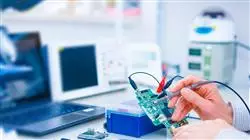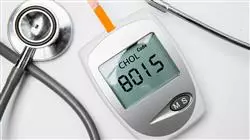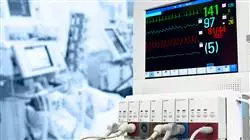University certificate
The world's largest faculty of engineering”
Description
Become a specialist in Biomedical Electronics and work to create the most revolutionary devices that can be used in the healthcare field with guaranteed success”

Electronics is present in nearly all areas of daily life, but if there is one where its presence is completely innovative, it is in the healthcare sector. The emergence of new and increasingly effective mechanisms has made it possible to diagnose diseases in time or to apply the latest treatments, thus improving the health of patients and increasing life expectancy. Meanwhile, investment in biomedical research and engineering is increasing, as large institutions and private companies have become aware of the importance of their development for the future of healthcare. For this reason, many engineers decide to diversify their field of action, directing their studies towards Biomedical Electronics and, for this reason, TECH has designed this program, which will enable professionals in the sector to broaden their knowledge in this field.
For this purpose, a very complete program has been structured, which includes fundamental aspects of microelectronics, analyzing the physical principles that govern the behavior of the fundamental elements of electronics; and delves into the most relevant characteristics and applications of transistors, diodes and amplifiers. Furthermore, digital processing is studied, which has experienced a vertiginous development in the last decades with the increasing implementation of devices based on digital electronics. Yet, naturally, focusing on Biomedical Electronics, addressing electrophysiology, the origin, conduction and acquisition of bioelectrical signals, as well as their filtering and amplification.
In short, a 100% online postgraduate diploma that will allow students to manage their own study time, meaning they are not hindered by fixed schedules or the need to commute to another physical location. They can access all the contents at any time of the day, allowing them to balance their professional and personal life with their academic life.
Biomedicine requires professionals like you, capable of creating those electronic instruments that will change healthcare”
This postgraduate diplomaa in Biomedical Electronics contains the most complete and up-to-date program on the market. The most important features include:
- Case studies presented by engineering experts
- The graphic, schematic, and practical contents with which they are created, provide scientific and practical information on the disciplines that are essential for professional practice
- Practical exercises where the self-assessment process can be carried out to improve learning
- Its special emphasis on innovative methodologies in Biomedical Electronics
- Theoretical lessons, questions to the expert, debate forums on controversial topics, and individual reflection assignments
- Content that is accessible from any fixed or portable device with an Internet connection
Open the doors to a new path full of job opportunities in the Biomedical Electronics sector”
Its teaching staff includes professionals from the field of engineering, who contribute their work experience to this program, as well as renowned specialists from leading companies and prestigious universities.
Its multimedia content, developed with the latest educational technology, will allow professionals to learn in a contextual and situated learning environment, i.e., a simulated environment that will provide immersive specialization for real situations.
This program is designed around Problem-Based Learning, whereby the student must try to solve the different professional practice situations that arise throughout the program. For this purpose, the student will be assisted by an innovative interactive video system created by renowned and experienced experts.
TECH offers you a multitude of theoretical and practical cases that will be very useful to improve your knowledge in this field"

Upon successful completion of this program, you will have acquired the necessary qualifications to enter a highly competitive industry"
Objectives
This program in Biomedical Electronics at TECH has been designed with the main objective of offering engineers a unique study opportunity to specialize in this field. In this way, this program will open the doors to a complex field of knowledge, allowing them to learn first-hand about the electronic devices that can be used in medical practices to diagnose and treat diseases effectively, thus improving the health of patients.

A top-level program designed to foster your professional growth in the field of Biomedical Electronics”
General Objectives
- Compile the main materials involved in microelectronics, properties and applications
- Identify the operation of the fundamental structures of microelectronic devices
- Understand the mathematical principles that govern microelectronics
- Analyze signals and modify them
- Examine the current techniques in digital processing
- Implement solutions for the processing of digital signals (images and audio)
- Simulating digital signals and devices capable of processing them
- Program elements for signal processing
- Design filters for digital processing
- Operate with mathematical tools for digital processing
- Value the different options for signal processing
- Identify and evaluate bioelectrical signals involved in a biomedical application
- Determine a design protocol of a biomedical application
- Analyze and evaluate biomedical instruments designs
- Identify and define the interferences and noise of a biomedical application
- Evaluate and apply electrical safety regulations
Specific Objectives
Module 1. Microelectronics
- Generate specialized knowledge on microelectronics
- Examine analog and digital circuits
- Determine the fundamental characteristics and uses of a diode
- Determine how an amplifier works
- Develop proficiency in the design of transistors and amplifiers according to the desired use
- Demonstrate the mathematics behind the most common components in electronics
- Analyze signals from their frequency response
- Evaluating the stability of a control
- Identify the main lines of technology development
Module 2. Digital Processing
- Convert an analog signal into a digital one
- Differentiate between the types of digital systems and their properties
- Analyze the frequency behavior of a digital system
- Process, code and de-code images
- Simulate digital processors for voice recognition
Module 3. Biomedical Electronics
- Analyze the signals, direct or indirect, that can be measured with non-implantable devices
- Apply the acquired knowledge of sensors and transduction in biomedical applications
- Determine the use of electrodes in bioelectrical signal measurements
- Develop the use of signal amplification, separation and filtering systems
- Examine the different physiological systems of the human body and signals for behavioral analysis
- Carry out a practical application of the knowledge of physiological systems in the measurement instrumentation of the most important systems: ECG, EEG, EMG, spirometry, and oximetry
- Establish the necessary electrical safety of biomedical instruments

If you are looking for the best program in Biomedical Electronics, don't think twice, this is the program for you”
Postgraduate Diploma in Biomedical Electronics.
Biomedical electronics is a branch of electronic engineering that focuses on the development of electronic devices and systems for application in medicine and biology. This area combines the principles of electronic engineering with those of biology and medicine to create technologies that can be used to improve human health and well-being.
Biomedical electronics focuses on developing devices that can be used to monitor, diagnose and treat disease. This involves creating systems that can detect and measure biological signals such as heart rate, temperature, blood pressure and muscle activity. Systems are also being developed for the delivery of therapies and drugs, such as infusion pumps and drug delivery systems.
The development of biomedical devices also involves the integration of signal and image processing techniques, as well as control and feedback algorithms to ensure accuracy and efficacy of treatment.
In addition, biomedical electronics also focuses on the development of diagnostic and monitoring systems, such as imaging systems (X-ray, magnetic resonance imaging, computed tomography, among others) and cancer detection systems. These devices enable early identification of diseases and assessment of patient health.
Biomedical electronics is a branch of electronic engineering that works on the development of electronic devices and systems for application in medicine and biology. Research in this area has led to the creation of devices and systems that can be used to monitor, diagnose and treat a wide variety of diseases and medical conditions, helping to improve human health and well-being.
The objective of this educational program is to provide students with knowledge and skills to design, develop and apply electronic technology in the field of medicine and health. Students will learn to use specialized software and hardware tools to acquire, process, visualize and analyze biomedical signals such as electroencephalograms, electrocardiograms, magnetic resonance imaging, computed tomography, among others.







